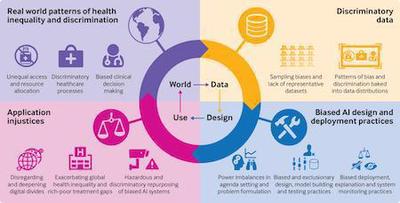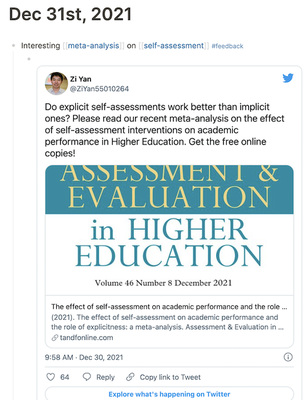You have read that I am criticizing the discourse on AI here in the last weeks and I have made a call for regulation of AI in education.
Die Stellungnahme des Ethikrates “Mensch und Maschine – Herausforderungen durch Künstliche Intelligenz” ist eine sehr ausführliche Diskussion der Entwicklung und dort werden verschiedenen übergreifende Herausforderungen und Problemfelder von KI in verschiedenen gesellschaftlichen Handlungsfeldern diskutiert. Der Unterabschnitt zu KI in der Schule ist mir aber nicht ausführlich genug und es fehlen aus meiner Sicht einige konkrete Probleme.
One of the things I have started recently is a book-project. For this purpose I have been working on a new writing workflow which combines reference management, reading, highlighting and note-taking, writing and publishing. In this short post I will try to describe the setup and workflow.
During a recent review process I have requested from authors that they should address from which standpoint they have approached their qualitative study. While I was referring in this comment the ontological and theoretical levels as formulated by Twining, Heller, Nussbaum & Tsai (2017) in the guidelines for the journal Computers &

„ChatGPT itself is a neutral tool, and how it is used depends on the intentions of those who use it.“ (Cohen, 2023). This messages is commmunicated by the US-based Association for Supervision and Curriculum Development (ASCD) to its 125 000 members (estimaton) regarding an AI-based tool which is currently pushing the discourse on AI in education.
„This has become a fashionable platitude, which…would result in a…content-free curriculum […]. This downgrading of knowledge is, ironies of ironies, to be implemented in the interest of creating a knowledge-based economy.“ (Coffield et al., 2004). It is a trend in nowadays discussion on education to criticize factual knowledge and the teaching and testing of it in educational institutions.
Since I am currently often asked about my opinion about ChatGPT I want to share why I do not write about ChatGPT. The discussion about ChatGPT (Generative Pretrained Transformer) is at least as annoying as the Wordle wave that has hit my social media channels some years ago.
If your productice work is 100% happening in digital environments the secure and reliable backup of data becomes a necessity and data-loss can have serious implications for all kind of processes. In this posting I will briefly describe my approach for the backup of data under the MacOS operating system.
Since many years I am using at least one external monitor for work and it has supported my productivity a lot. During an intensive time of online-meetings and online-teaching in the last 3 years I have extended my setup with another external screen so that I have three screens available.
Download the PDF of the CfP Special issue editors Dr. Michael Kerres, University Duisburg-Essen, michael.kerres@uni-due.de, http://kerres.name Dr. Pavlo Antonenko, University of Florida, p.antonenko@coe.ufl.edu, https://education.ufl.edu/faculty/antonenko-pavlo-pasha/ Dr. Marco Kalz, University of Education, Heidelberg, kalz@ph-heidelberg.de, https://kalz.cc Important Dates • March 15, 2022 —outlines of

The break and transition into the new year is always a time for me to optimise my workflows or to explore some changes in the way I handle information, tasks or communication. Via some tweets by Doug Holton I have discovered Logseq as a new framework and tool to handle my information workflow.